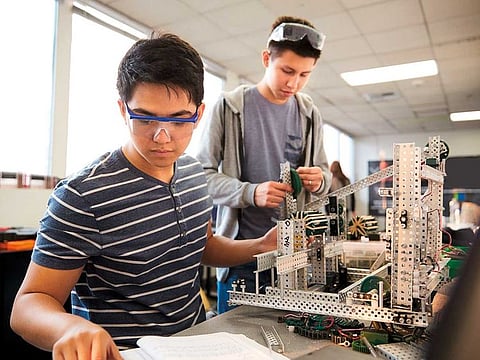Break into tech
GN Focus looks at the key skills you need to improve your employability in the tech sector

In the near future, it is more likely you will be heading to the balcony instead of the door to receive your online purchases and food orders. Delivery drones and aerial robots are expected to dot the skies, along with flying cars and taxis. But who will be in the background, managing and servicing this new-fangled sector? Well, it will most likely be the current crop of students, who are keeping track of emerging tech trends and preparing themselves to turn these trends into lucrative career opportunities.
Mohamed Al Suwaidi, Chairman and Founder of the Dubai-based Vision Concept Aviation Training Institute (VCATI), asserts that it is critical to prepare for the future needs of both the industry and the students. VCATI offers a course that trains students to design, maintain and repair drones, flying cars and hover bikes.
This BTEC course is uniquely structured to cater to the technological evolution of an industry taking the aerial route for transport and delivery. It will enable students to participate in the next trillion-dollar opportunity.

“This BTEC course is uniquely structured to cater to the technological evolution of an industry taking the aerial route for transport and delivery. It will enable students to participate in the next trillion-dollar opportunity.”
Career in technology
Mohammad Abdullah, Managing Director of Dubai International Academic City (DIAC) and Dubai Knowledge Park, observes that university degrees usually take four years to complete, leaving students to predict that industries will be in demand in the future. But as the world becomes more digitalised, we can be sure of more opportunities opening up in STEM.
Currently, DIAC universities offer a total of 142 degrees in STEM, and Abdullah insists these will not only enhance employment prospects but also allow students to negotiate higher salaries upon entering the workforce. “Technical and vocational training are also vital aspects of meeting the growing demands of strategically important business sectors in the UAE.”
Technical and vocational training are also vital aspects of meeting the growing demands of strategically important business sectors in the UAE.

While planning their future career, Abdullah encourages students to employ “design thinking” that focuses on a solution-based approach — starting off by deciding what impact they would like to have in the world, then choosing a career path to support their goals. Thereafter, they can select a degree that will act as a mechanism of achieving their objectives. “This new wave of thinking will help students think about the challenges in the world and empower them to solve these issues.”
Technology should be integrated into the curriculum through continuous interaction with leading industry personnel, open-ended project courses, assignments, lab work and even capstone projects both in terms of design and presentations.

Dr R. N. Saha, Director, BITS Pilani, Dubai Campus, believes that industries grow on new technologies created at universities. “Technology should be integrated into the curriculum through continuous interaction with leading industry personnel, open-ended project courses, assignments, lab work and even capstone projects both in terms of design and presentations,” he says, adding that students must cultivate the capacity and mindset to innovate and be an entrepreneur, while wholeheartedly embracing and immersing themselves into technology.
In-demand skills
With the accelerated pace of digital transformation in this region, digitals skills will be in demand.
“Companies are increasingly looking for talent in cybersecurity, blockchain, artificial intelligence and data science, to name a few,” says George Habel, Apple Practice Manager at MDS Computers Group, a company that implements technology in schools. “Adoption of all these technologies requires specialised education at school and university level.”
Adoption of all these technologies requires specialised education at school and university level.

He adds that educational institutes in the UAE have been at the forefront in adopting technology to help students develop skills to prepare for the future.
Habel offers the example of the One Million Arab Coders initiative, launched in October 2017, which aims to develop digital and coding skills in emerging areas such as AI, robotics, cognitive and biological sciences and programming. “By developing skills of the future today, the UAE is building employment opportunities for its youth.”
Meanwhile, in a recent study across seven countries in the Middle East and Europe, IT security training company SANS Institute found that among the 14- to 18-year-olds, the choice of IT (including cybersecurity) as a career was highest in Saudi Arabia and the UAE, at 47 per cent and 46 per cent respectively.
Chris Dale, SANS Institute Instructor, points out that technology moves fast, creating challenges for universities. “The pace of change is perhaps too fast for the standard way in which universities update and maintain their curriculum in order keep up with developments and stay relevant and up to date.” It’s therefore very important for universities to discover “clever ways of teaching timeless material”, which is as relevant today as it will be tomorrow, irrespective of how technology changes.
The pace of change is perhaps too fast for the standard way in which universities update and maintain their curriculum in order keep up with developments and stay relevant and up to date.

Many of the skills you can learn from a book will soon be considered outdated, and better, more effective frameworks, tools and techniques are already available online. Dale advises students not to silo themselves into a specific niche and instead have the belief that they can always understand new technology. “There are normally hundreds of tutorials and examples on technology today, hence you can start implementing prototypes of your ideas, and perhaps that allows you to learn better and faster.”
So, it seems for students, the key to unlocking a successful career is not in knowing where technology currently is, but in anticipating where it is likely to be by the time they graduate and step out into a brave new connected world.



